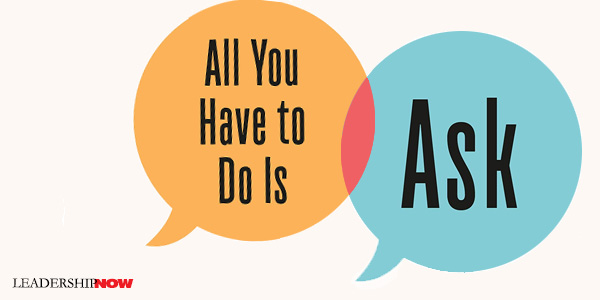 |
 |
02.21.20

All You Have to Do Is Ask
IF WE ARE HONEST with ourselves, we know there are times we need help. We just don’t want to ask for it. We’re confident we can figure it out. In time. But here’s the thing. There’s nothing we are going through or trying to figure out that others haven’t blazed a trail for us already. We just need to ask. Wayne Baker says, “you never know what people know—or who they know—until you ask. Asking for help can mean the difference between success and failure.” In All You Have to Do Is Ask he identifies eight reasons why we don’t or won’t ask. As a result, we leave a lot of answers, solutions and resources on the table for no good reason. And here are eight no good reasons:
That last reason—the fear of seeming selfish—relates to the proverb that it’s better to give than receive. That’s true. We want to be givers, but that doesn’t make receiving a bad thing. “There’s no giving without receiving, and there is no receiving without giving. And it’s the request that starts the wheel turning.” Baker offers a quick scientific assessment in the book (or online) to determine what style of asking/giving you tend to choose. And it is a choice. Are you an overgenerous giver, a selfish taker, a lone wolf, or a giver-requester? These types all represent “choices you can make about how you want to operate in the world.”
The place to begin is to understand and articulate your needs. Know what you are trying to accomplish and when. With that in mind, formulate a SMART request. That is a Specific (“a specific request yields more help than a vague one”), Meaningful (“Why is the request important to you?”), Action-oriented (What action do you want to be taken?), Realistic (it may be a serious long-shot, but within the realm of possibility), and Time-bound (“every request should have a due date”) request. After you have formulated your request, you need to figure out who to ask. Who knows what you need to know or who you need to talk to? Go outside your usual circle of contacts. Then ASK. And a good piece of advice: “Rejection is just an opinion. And opinions change. In other words, you can find ways to turn a no into a yes.” Baker offers much more specific advice and examples throughout but let me mention two tools that have proven effective that Wayne Baker and Adam Grant have developed. The first is Reciprocity Rings. Reciprocity Rings A Reciprocity Ring is a group activity consisting of 20 or so people that gather together and share a request with the group one by one. “Other members of the group pause to consider how they could help: Do I have the resource the person needs? Of not, do I know someone in my network who might be able to help? Because it’s much easier for people to make a request when they know that everyone must make one, every participant is required to make a request; asking is the ‘ticket of admission’ to the Reciprocity Ring.” Reciprocity Rings have been implemented successfully at Google, General Motors, IBM, Citigroup, UPS, and others. Givitas Givitas is a collaborative technology platform that provides a safe platform for requesting, giving, and receiving help across boundaries across a vast scale. It helps you share widely beyond the usual suspects. Platforms like Givitas allow people to get what they need without having to repeatedly tap all the same experts or all the usual go-to people because requests are decentralized and broadcast across the vast network. Thanks For Asking We’ve all asked for help only to be rebuffed or made to look stupid. Of course, we recognize and reward people for giving help, but we don’t typically reward people for asking for help. “How our request is received, how we are treated, and how the help is granted determines whether we get discouraged, or encouraged to make asking a personal practice.” With both organizational and individual success at stake, we need to rethink our responses to asking. “Recognizing, appreciating, and rewarding those who ask is as critical as doing the same for those who answer.” Baker shares informal and formal ways we can as individuals and organizations recognize, reward, and encourage asking. Asking improves individual performance and effectiveness. All You Have to Do Is Ask will change your appreciation of asking. It certainly changed my view. 
Posted by Michael McKinney at 05:34 PM
|
BUILD YOUR KNOWLEDGE
 

How to Do Your Start-Up Right STRAIGHT TALK FOR START-UPS 
Grow Your Leadership Skills NEW AND UPCOMING LEADERSHIP BOOKS 
Leadership Minute BITE-SIZE CONCEPTS YOU CAN CHEW ON 
Classic Leadership Books BOOKS TO READ BEFORE YOU LEAD |